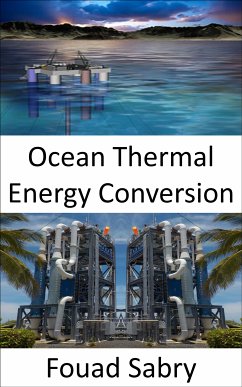What Is Ocean Thermal Energy Conversion
Ocean Thermal Energy Conversion (OTEC) is a process that makes use of the temperature difference that exists in the ocean between the deeper, cooler waters and the warmer, shallower or surface waters in order to power a heat engine that generates useful work, most commonly in the form of electricity. OTEC is able to function with a capacity factor that is very high, and as a result, it is able to function in base load mode.
How You Will Benefit
(I) Insights, and validations about the following topics:
Chapter 1: Ocean thermal energy conversion
Chapter 2: Heat engine
Chapter 3: Power station
Chapter 4: Combined cycle power plant
Chapter 5: Rankine cycle
Chapter 6: Cogeneration
Chapter 7: Chiller
Chapter 8: Deep ocean water
Chapter 9: Thermal power station
Chapter 10: Solar desalination
Chapter 11: Surface condenser
Chapter 12: Binary cycle
Chapter 13: Steam-electric power station
Chapter 14: Osmotic power
Chapter 15: Transcritical cycle
Chapter 16: Deep water source cooling
Chapter 17: Mist lift
Chapter 18: Evaporator (marine)
Chapter 19: Low-temperature thermal desalination
Chapter 20: Copper in heat exchangers
Chapter 21: Low-temperature distillation
(II) Answering the public top questions about ocean thermal energy conversion.
(III) Real world examples for the usage of ocean thermal energy conversion in many fields.
(IV) 17 appendices to explain, briefly, 266 emerging technologies in each industry to have 360-degree full understanding of ocean thermal energy conversion' technologies.
Who This Book Is For
Professionals, undergraduate and graduate students, enthusiasts, hobbyists, and those who want to go beyond basic knowledge or information for any kind of ocean thermal energy conversion.
Ocean Thermal Energy Conversion (OTEC) is a process that makes use of the temperature difference that exists in the ocean between the deeper, cooler waters and the warmer, shallower or surface waters in order to power a heat engine that generates useful work, most commonly in the form of electricity. OTEC is able to function with a capacity factor that is very high, and as a result, it is able to function in base load mode.
How You Will Benefit
(I) Insights, and validations about the following topics:
Chapter 1: Ocean thermal energy conversion
Chapter 2: Heat engine
Chapter 3: Power station
Chapter 4: Combined cycle power plant
Chapter 5: Rankine cycle
Chapter 6: Cogeneration
Chapter 7: Chiller
Chapter 8: Deep ocean water
Chapter 9: Thermal power station
Chapter 10: Solar desalination
Chapter 11: Surface condenser
Chapter 12: Binary cycle
Chapter 13: Steam-electric power station
Chapter 14: Osmotic power
Chapter 15: Transcritical cycle
Chapter 16: Deep water source cooling
Chapter 17: Mist lift
Chapter 18: Evaporator (marine)
Chapter 19: Low-temperature thermal desalination
Chapter 20: Copper in heat exchangers
Chapter 21: Low-temperature distillation
(II) Answering the public top questions about ocean thermal energy conversion.
(III) Real world examples for the usage of ocean thermal energy conversion in many fields.
(IV) 17 appendices to explain, briefly, 266 emerging technologies in each industry to have 360-degree full understanding of ocean thermal energy conversion' technologies.
Who This Book Is For
Professionals, undergraduate and graduate students, enthusiasts, hobbyists, and those who want to go beyond basic knowledge or information for any kind of ocean thermal energy conversion.
Dieser Download kann aus rechtlichen Gründen nur mit Rechnungsadresse in A, B, BG, CY, CZ, D, DK, EW, E, FIN, F, GR, H, IRL, I, LT, L, LR, M, NL, PL, P, R, S, SLO, SK ausgeliefert werden.


